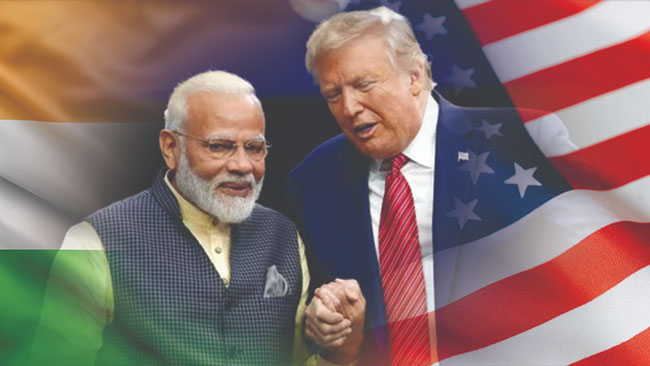New Delhi:Prime Minister Narendra Modi’s visit to the United States this week for talks with President Donald Trump has global implications. The upcoming discussions between the two leaders will centre on defence cooperation, trade relations, and countering China’s growing economic and military influence.
One of the key items on the agenda will be the India-Middle East-Europe Economic Corridor (IMEC), a multi-national infrastructure initiative that aims to create an alternative to China’s Belt and Road Initiative (BRI). A crucial player in this ambitious project is Gautam Adani’s Adani Group, a company that has rapidly expanded its footprint across key infrastructure sectors, from ports and power plants to defence technology.
IMEC: Response to China’s Belt and Road Initiative
The India-Middle East-Europe Economic Corridor (IMEC) is a massive infrastructure project designed to connect India to Europe via the Middle East. Unlike China’s BRI, which has been criticised for debt-trap diplomacy, IMEC is seen as a market-driven, transparent initiative that ensures participating nations retain control over their infrastructure.
The $400 billion China-Iran Comprehensive Strategic Partnership has raised concerns among global players. The partnership includes extensive cooperation in energy, trade, and military domains, potentially giving China a stronger foothold in the Middle East. This has further accelerated India’s push to build alternative supply chains and trade routes – one of the main motivations behind IMEC.
Some of the key features of IMEC are a 4,500-kilometre trade route connecting India, the UAE, Saudi Arabia, Israel, and Europe. The corridor will significantly cut transit times compared to traditional sea routes. Partner nations will also benefit from new ports, rail networks, and energy projects.
Currently, critical maritime chokepoints such as the Malacca Strait, the Strait of Hormuz, and the Bab el-Mandab are increasingly vulnerable to Chinese influence. According to a Center for International Maritime Security report, China indirectly supports Yemen’s Houthi rebels by purchasing large quantities of Iranian oil, which funds Iran’s Islamic Revolutionary Guard Corps (IRGC). The IRGC, in turn, supplies the Houthis with weapons, some of which are reportedly Chinese-made.
Role Of Adani Group In IMEC
The Adani Group has vast interests in energy, infrastructure, and logistics. The conglomerate’s strategic investments align closely with India’s foreign policy objectives and directly challenge China’s infrastructure dominance.
The Adani Group’s acquisition of a 70 per cent stake in Israel’s Haifa Port is a crucial component of IMEC. This move does not just strengthen India-Israel ties but also provides India a foothold in the Mediterranean.
Israel-India defence trade is valued at over $10 billion annually, with private-sector engagement further strengthening the relationship.
The group is also actively acquiring strategic ports across the Indo-Pacific. Unlike China’s state-controlled model, Adani operates as an independent private entity.
Beyond ports, the company is expanding into military drone production, semiconductors, and clean energy, sectors that are central to India’s economic future. The company in November last year announced a $10 billion investment in US energy infrastructure, creating up to 15,000 jobs in the United States.
India-US Bilateral Relations
PM Modi’s visit to the US comes amid concerns over Trump’s controversial trade policies. Last month he announced a 25 per cent tariff on Canadian and Mexican imports and an additional 10 per cent tax on Chinese goods, raising speculation about potential trade frictions with India.
India and the United States have steadily deepened their military and defence cooperation over the past two decades, driven in part by China’s influence in the Indo-Pacific and beyond. The upcoming Trump-Modi meeting is expected to focus on multiple areas of defence collaboration.
India seeks access to advanced US military technology, including jet engine manufacturing, drone technology, and cyber defence systems. Both countries have expanded military cooperation through exercises like Malabar (a trilateral naval exercise with Japan). With increasing cyber threats from state and non-state actors, cybersecurity cooperation will also be a topic of discussion.




